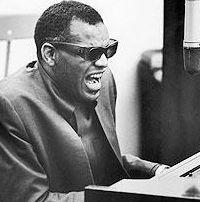-
BLACK MUSIC MONTH - PART III: Gospel - It's More Than Praise And Worship
June 17, 2008
Have an opinion? Add your comment below. -
A large and growing part of the black music world in 2008 centers around gospel music and radio. Both are growing and expanding their audience base. Gospel music has crossed over. There have always been just a scant few gospel artists who have crossed over, beginning with Mahalia Jackson's "Rusty Old Halo" back in the '50s and continuing with The Edwin Hawkins Singers' "Oh Happy Day" in the '70s. Then there were The Staple Singers' "I'll Take You There." Today Kirk Franklin would be a good example of an artist, or group of artists who consistently crosses over and gets mainstream airplay on not only Urban AC stations, but often on mainstream Urban stations as well.
Beginning several years ago and continuing through today, gospel music has shaken itself awake from a general malaise. The staffs and roster cuts seem to be in line with other formats. Television seems to be eliminating the indiscrete evangelists, and many of the top names in black gospel have new releases.
 Ray Charles
Ray CharlesIt is a well-accepted fact that many of our most popular artists started out singing gospel music, and they often include at least one or two gospel selections on every album. Aretha Franklin who, for most of us, will always be "The Queen Of Soul," Rev. Al Green and the late great right reverend Ray Charles -- each of whom became huge mainstream crossover artists and who had a series of major hits -- still leave no doubt about their gospel roots.
Today, Marvin Sapp has a top-5 song, not on just on the Black Gospel charts, but also on the Urban AC charts. His song, "Never Would Have Made It," touches everybody. So when we say, today's gospel is about more than just praise and worship, that's what we mean. Radio, too, has recognized how very popular these artists and their music have become. So much so that there are full-signal FM stations entirely devoted to gospel. Many of these stations, in markets such as Atlanta, Philadelphia and Memphis, have consistently been at or near the top of the ratings.
Some of the most highly acclaimed and best-loved gospel and R&B artists raise their voices in joyful tribute daily. Syndication One's Yolanda Adams is but one of many singers who have been able to syndicate their shows. AURN's Dr. Bobby Jones' Gospel Countdown, along with Walt Love's Gospel Trax, Inspirations Across America, Rejoice, BeBe & CeCe Winans and others continue to prove the strength and power of gospel music on the radio. Ready to launch next month is a brand new syndicated weekend offering from DMI called "Serving Up Soul," which will feature another Winans, Vicky, who is the youngest Winans to have her own weekly syndicated show.
Gospel Radio
From a pure economic standpoint, Gospel radio is still suffering in 2008. It was once easy to blame gospel's difficulties on poor ratings, but there are Gospel stations that have ratings at or near the top -- and they still have problems. Ratings alone don't define the problem or provide a solution. Agencies and sales reps are as guilty of looking at those numbers as much as the advertisers and the stations, but they say they need more to work with, and unless the stations are willing to give better deals -- off the rate card -- there's little they can do.
Gospel's unusual demographics have worked against it in the past, but the small amount of research that has been done on the format may soon reverse that trend. One thing about the unduplicated gospel audience, it allows advertisers to reach people they can't reach anywhere else. But to get the advertising it deserves, Gospel radio in the future is going to have to match secular radio step for step.
Most of us believe that Gospel has a very positive image, not only with its audience, but with its advertisers as well. It is rare that clients will say, "We don't want to buy Gospel." Instead they may say, "We're looking for this particular audience," or "We don't want a young Urban audience." Very seldom do we see clients prejudiced against the gospel market. At the same time, there are some agencies and media buyers who prefer certain formats over Gospel, mainly because they are more comfortable and familiar with those formats. They are more familiar with Urban mainstream or Urban AC and when they look at the ratings, they see that Gospel doesn't necessarily fare as well in some markets. In other markets, it soars.
Every market situation is unique and the success of Gospel differs from one market to the next. In 2008 we are seeing less and less emphasis placed on Gospel's ratings and more buying decisions placed on qualitative research. Media buyers will always look at the audience and they aren't going to buy around the format. For example, in Atlanta the buyers invariably look at the Arbitron qualitatives and then look at anything the stations can give them to back up what they feel is a good profile of their listeners. Personally, we would love to see Gospel bought on a qualitative basis. The reality is, however, that the buyers have to answer for their decisions and the easiest way and thing to fall back on is cost per point.
Every format goes through its up and down trends, and Gospel has been experiencing its cycle. During these cyclical periods, Gospel stations learn a lot about themselves and their format. It causes them to examine their roots and to study what their audience is really after. Possibly the best thing that can happen to a Gospel station is for it to have a down book; this way it will go out and work hard to correct whatever is wrong.
On the whole we see a very bright future for Gospel. Gospel's listeners are extremely loyal and a buy can add a lot of reach by adding a unique format to the schedule. Gospel certainly has a lot of room to grow and improve. The format has developed over the years and will continue to build and get even stronger in the future. Labels, talent and radio are more sharply focused and in better shape to grow with renewed purpose than ever before. Like other music forms, Black Gospel is going to have to look more at the Internet, direct-mail television marketing and record clubs to get its product in front of the people who could appreciate and buy it. Black Gospel and music in 2008 are more than just praise and worship. Maybe that's because in addition to everything else, they have God on their side.
Word.
Copyright © 2024 Mediabase. All rights reserved.

